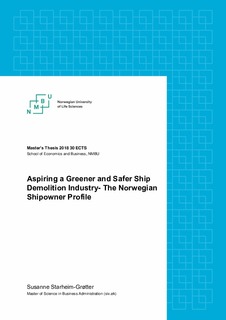| dc.description.abstract | The world’s merchant fleet plays a crucial role in the global economy, and decisive for its size is the number of vessels subject for demolition. The vast majority of them end their lives at the beaches in India, Bangladesh and Pakistan, dismantled manually right there. Environment and human lives are at risk, given these yards’ improper handle of hazardous wastes and abusive work conditions. Because these yards have lower costs related to the dismantling process, they can pay the shipowner considerably more for their vessels, compared to green and safe demolition yards.
There are legislative loopholes in the Hong Kong convention, the EU ship recycling regulations and the Basel convention. And in absence of global and uniform standards, the beaching practice continues along the South Asian shores, allowing the shipowner to pursue full profit maximization.
Some Norwegian shipowners have taken an active stand against the practice of beaching, and choose to recycle their vessel in a sustainable manner, and thereby accept a weighty additional cost. From a starting point where the shipowner is defined as a pure profit maximizing actor, the purpose of this study is to answer if the shipowner acknowledges his overall value chain responsibility, or if the costly choice of green ship recycling simply is good business.
Qualitative research method framed in a case study design was found most suitable in order to conduct this in a thorough manner, seeking extensive information of three Norwegian shipowners.
There were no findings indicating that green ship recycling could be considered “good business”, in the sense that there were no clauses in contracts with third-parties that forced through any decision of sustainable recycling. And, although difficult to empirically test, the shipowners have no proven advantageous terms or better positions in negotiations reducing the overall costs because of a well perceived corporate reputation. Currently the shipowners’ motivation to choose a safe and sound recycling is driven by an internal form of CSR, and the genuine desire to be decent and do good. The case of silent third-parties may change going forward, and the much media-created black-and-white picture of beaching is probed. However, since the demolition process from a shipowners’ point of view currently appears to be a carte blanche, transnational government involvement is urgently called for to enhance business integrity and conformity.
The findings in this study are not so that they can be used as basis for broad generalization, however, they can rather be of interest for further research. | nb_NO |

